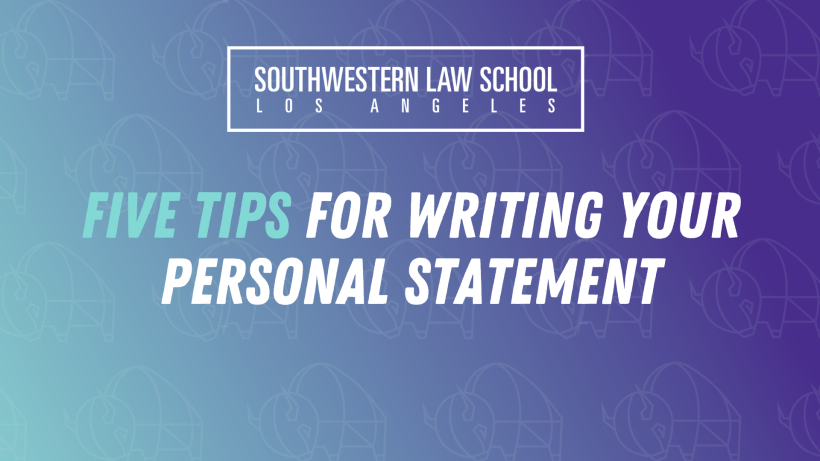SWLAW Blog | Future Students

November 10, 2022
Draft Your Personal Statement Like a Pro: Our Dean of Admissions Shares her Top Tips!
 Dean of Admissions Lisa Gear has read innumerable personal statements – some that are compelling narratives and convincing pieces of writing, and others that are a jumble of disjointed sentences and unconnected ideas. As an applicant, the personal statement is actually one aspect of your file over which you can exercise significant control, and there are a number of steps you can take to ensure that this piece of writing is one of the best you have ever composed – after all, your admission to law school hinges on it!
Dean of Admissions Lisa Gear has read innumerable personal statements – some that are compelling narratives and convincing pieces of writing, and others that are a jumble of disjointed sentences and unconnected ideas. As an applicant, the personal statement is actually one aspect of your file over which you can exercise significant control, and there are a number of steps you can take to ensure that this piece of writing is one of the best you have ever composed – after all, your admission to law school hinges on it!
To help you navigate this application component with confidence, check out Dean Gear’s top tips for the personal statement!

Although the personal statements you submit to each school may be similar to one another, keep in mind that schools may have instructions specific to their process. Read through any provided prompts and guidelines to make sure that your personal statement accurately responds to the questions and requirements. Following directions is the first step in demonstrating you have the seriousness and attention to detail necessary to be a successful law student.

Keep the focus of the personal statement on YOU! Although you may have been inspired by a person, a movement, or an experience, the bulk of your statement should hone in on your qualities and how they make you a great candidate for admission to the school. Don’t worry about telling the Admissions Committee what you think we want to hear; instead, write authentically and in your own voice. If done correctly, your personal statement will tell a story about yourself that demonstrates why you have earned the opportunity to attend law school.

Remember that the personal statement should be positive and place you in the best light possible. Don’t use this valuable space to address poor grades or LSAT history, which can be covered elsewhere in a brief addendum. Also avoid simply regurgitating your resume. Your personal statement is an opportunity for you to expand upon your experiences and using them to convince your application reader that you have what it takes to be successful at their school.
Most importantly, being confident in your story requires that you embrace your path to law school. There’s no forumulaic way to compose a personal statement, and no single archetype that is best (e.g. the “sob story,” the “transformative moment,” the “underdog athlete,” etc.). Although some applicants may have a path wrought with hardships they have overcome, others may have a path of growth, accomplishment, and recognition. Whatever your story, tell it candidly and with pride.

No one else’s story will be quite like yours! Use your own voice and facility with language to make your statement engaging and interesting. Using famous quotes, song lyrics, or passages lifted from other works diminishes the distinctive qualities of your story and deprives you of the opportunity to share your own thoughts and ideas with the reader.

Nothing messes up an otherwise good personal statement like poor grammar or silly mistakes. Functions like “Replace All” and “Track Changes” are not as effective as proofreading. Proofread your personal statement multiple times before you submit and consider having a trusted friend or family member proofread it, too!

What could be worse than poor grammar and sloppy spelling? Poor judgment!
Your personal statement can touch on sensitive topics or hot-button issues, but keep in mind that it is meant to demonstrate your ability to be professional. Make sure that whatever your story is, you tell it in a manner that is thoughtful and polished.